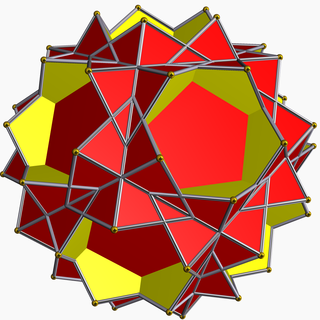Small stellated truncated dodecahedron
| Small stellated truncated dodecahedron | |
|---|---|
 | |
| Type | Uniform star polyhedron |
| Elements | F = 24, E = 90 V = 60 (χ = −6) |
| Faces by sides | 12{5}+12{10/3} |
| Wythoff symbol | 2 5 | 5/3 2 5/4 | 5/3 |
| Symmetry group | Ih, [5,3], *532 |
| Index references | U58, C74, W97 |
| Dual polyhedron | Great pentakis dodecahedron |
| Vertex figure |  5.10/3.10/3 |
| Bowers acronym | Quit Sissid |
In geometry, the small stellated truncated dodecahedron or quasitruncated small stellated dodecahedron is a nonconvex uniform polyhedron, indexed as U58. It is given a Schläfli symbol t{5/3,5}, and Coxeter diagram ![]()
![]()
![]()
![]()
![]() .
.
It has 12 pentagons and 12 decagrams, {10/3} faces.
Related polyhedra
It shares its vertex arrangement with three other uniform polyhedra: the convex rhombicosidodecahedron, the small dodecicosidodecahedron and the small rhombidodecahedron.
It also has the same vertex arrangement as the uniform compounds of 6 or 12 pentagrammic prisms.
 Rhombicosidodecahedron |  Small dodecicosidodecahedron |  Small rhombidodecahedron |
 Small stellated truncated dodecahedron |  Compound of six pentagrammic prisms |  Compound of twelve pentagrammic prisms |
See also
- List of uniform polyhedra
External links
- Weisstein, Eric W. "Small stellated truncated dodecahedron". MathWorld..mw-parser-output cite.citation{font-style:inherit}.mw-parser-output .citation q{quotes:"""""""'""'"}.mw-parser-output .citation .cs1-lock-free a{background:url("//upload.wikimedia.org/wikipedia/commons/thumb/6/65/Lock-green.svg/9px-Lock-green.svg.png")no-repeat;background-position:right .1em center}.mw-parser-output .citation .cs1-lock-limited a,.mw-parser-output .citation .cs1-lock-registration a{background:url("//upload.wikimedia.org/wikipedia/commons/thumb/d/d6/Lock-gray-alt-2.svg/9px-Lock-gray-alt-2.svg.png")no-repeat;background-position:right .1em center}.mw-parser-output .citation .cs1-lock-subscription a{background:url("//upload.wikimedia.org/wikipedia/commons/thumb/a/aa/Lock-red-alt-2.svg/9px-Lock-red-alt-2.svg.png")no-repeat;background-position:right .1em center}.mw-parser-output .cs1-subscription,.mw-parser-output .cs1-registration{color:#555}.mw-parser-output .cs1-subscription span,.mw-parser-output .cs1-registration span{border-bottom:1px dotted;cursor:help}.mw-parser-output .cs1-ws-icon a{background:url("//upload.wikimedia.org/wikipedia/commons/thumb/4/4c/Wikisource-logo.svg/12px-Wikisource-logo.svg.png")no-repeat;background-position:right .1em center}.mw-parser-output code.cs1-code{color:inherit;background:inherit;border:inherit;padding:inherit}.mw-parser-output .cs1-hidden-error{display:none;font-size:100%}.mw-parser-output .cs1-visible-error{font-size:100%}.mw-parser-output .cs1-maint{display:none;color:#33aa33;margin-left:0.3em}.mw-parser-output .cs1-subscription,.mw-parser-output .cs1-registration,.mw-parser-output .cs1-format{font-size:95%}.mw-parser-output .cs1-kern-left,.mw-parser-output .cs1-kern-wl-left{padding-left:0.2em}.mw-parser-output .cs1-kern-right,.mw-parser-output .cs1-kern-wl-right{padding-right:0.2em}
This polyhedron-related article is a stub. You can help Wikipedia by expanding it. |